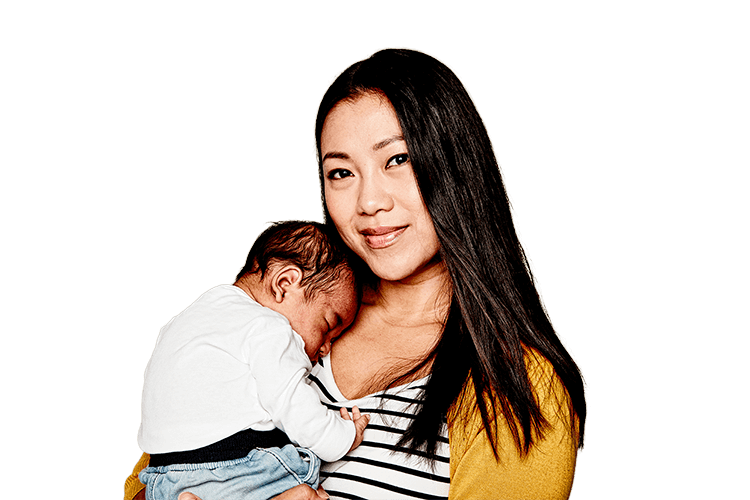Meeting your baby for the first time is one of life’s greatest moments. It’s hard to believe you created such a bundle of perfection! But the journey to parenthood isn’t always so sweet. It’s a rollercoaster of challenges and emotions and sometimes you just want to stop the ride. Here's how to prepare, and what you can do if you need help.

Research has shown between 15 and 22 per cent of women experience depression during pregnancy and/or following the birth of their baby. Many of these women will also experience anxiety.
Anxiety and depression are also prevalent in men in the perinatal period. An estimated 10 per cent of men experience perinatal depression and up to 25 per cent experience anxiety.
In 2019, Beyond Blue analysed search terms that might indicate signs of anxiety and depression during and after pregnancy. “I don’t love my baby” was searched 3,840 times in 2018; “Am I a bad mother?” 3,800 times; “I hate being pregnant” 15,600 times; and “I feel alone in my pregnancy” just over 2,000 times.
So, what are some of the steps you might take to look after your mental wellbeing before and after your baby’s birth?
Why it can be a ‘bumpy’ ride
As quickly as those two positive lines appear on your test, your world starts to change. Fuelled by raging hormones and a changing body, you will experience emotions ranging from joy and excitement to fear and anxiety, and everything in between.
“It’s completely normal to feel anxious and stressed during pregnancy,” says Julie Borninkhof, CEO of Perinatal Anxiety and Depression Australia (PANDA). “We know the number of women who struggle is far greater than that reported. Many women suffer in silence and don’t seek help or a diagnosis.”
Anxiety in pregnancy is fuelled by issues such as finances, living conditions, navigating the workplace and concerns about having a limited support network.
There’s also significant concern around identity. “We’ve spent our whole life building up an identity, and the thought of becoming a parent displaces and challenges that,” says Borninkhof. “Women spend pregnancy judging their capacity to be a parent, but they’ve not yet got the tools or the real baby to connect with.”
When anxiety becomes a problem
Ups and downs in pregnancy are all part of the ride. But if you’re spending the majority of time feeling flat or anxious and it's affecting your day-to-day life, it might be time to seek help.
“As women, we tend to put ourselves last and downplay our problems, but it’s so important that we don’t,” says Borninkhof. “There’s absolutely no shame in seeking help, especially before negative feelings become too entrenched or too big to cope with.”
Signs of depression and anxiety include disengagement from your support or daily activities, disturbed sleep or insomnia, loss of appetite, and not taking care of yourself.
“Don’t minimise these early warning signs,” says Borninkhof. “You don’t want your mental and emotional health getting to the point where you can’t connect with your baby or your support network.
“Even just reaching out once can be enough to get you back on track and help you to establish new behaviours to make yourself feel better.”
There is also much you can do to help your mental and emotional wellbeing while you’re pregnant. Beyond Blue suggests some of these options:
- Don’t expect too much of yourself – make time to slow down, rest and relax. Meditation and mindfulness practices can be very helpful, too, in helping with feelings of being overwhelmed and anxious
- Talk to someone you trust about your feelings. Sharing your concerns can be really helpful
- Extend your support network – other expectant parents can be a valuable resource
- Don’t be afraid to ask questions when you visit your GP, obstetrician or midwife
- Be careful what you read – some websites and articles might make you feel worse. Make sure they are from trusted sources.
When baby arrives
Mothers are constantly exposed to images of what ‘perfect’ motherhood looks like, from television ads to social media posts by ‘supermums’ who never look anything but immaculate from the moment their baby is born. But those pictures are very rarely close to reality.
“Society often makes parenting look so easy, but it’s a really hard experience for most of us,” says Borninkhof. “It challenges us emotionally and socially and it takes time to adjust.”
Through pregnancy, there can be a lot of second-guessing about whether you really want a child. When the baby’s born, you may not feel an immediate connection.
Similarly, feelings of envy and failure can be triggered when we see other new mums who seemingly have it all: the baby who sleeps, the supportive partner, and a family support network close by.
“We’re often our own worst critics, but there’s no need to be embarrassed or ashamed by any of these feelings,” says Borninkhof.
“Others may look like they’re coping, but you don’t see behind closed doors. Many women struggle bridging their old life and their new. Even the strongest of rocks crumble at times.”
There are so many contributing factors to perinatal depression and anxiety. Lack of sleep and family support, exhaustion, birth trauma and recovery and an unsettled baby, to name a few.
If you feel like things are getting on top of you, PANDA has a mental health checklist for expecting and new parents which will help assess indicate whether you need to seek help.
“There’s no reason to be ashamed in reaching out for help,” says Borninkhof. “We’re all super parents because we’re giving it our best shot, but some days we’ll feel like complete failures and that’s okay.”
Consider simple steps you can make to help your emotional and mental wellbeing. Beyond Blue has these helpful suggestions:
- Remember your own needs as well as your baby’s: looking after yourself is looking after your baby
- You will probably receive lots of advice about caring for your bub, but be open to working out what suits you and your family
- Ask for and accept help – even before you need it. Planning to have additional support in the first few months by asking your partner, family members or friends to be on hand can really help
- Think about what you can do day-to-day to make yourself feel good. Staying in your pyjamas all day might make you feel great, or it may not. Figure out what works for you
- Try not to make major life changes like moving house or changing jobs in the first few months after you have your baby.
For help and further information, contact PANDA on 1300 726 306, or visit their website. Beyond Blue has a very helpful resource called Emotional health and wellbeing: A guide for pregnant women, new parents and other carers. Call 1300 22 4636 or visit their website.
Need a little extra support?
Health Concierge
Whether it’s taking you a little longer to fall pregnant than you expected, or you know you’ll be needing a bit of extra help, Medibank’s Health Concierge service is there to help. You can call 1800 789 414 for support and guidance, available at no extra cost for members with residential hospital cover#.
Got a health question? 24/7 Medibank Nurse Support
Medibank health insurance members can speak to a registered nurse over the phone or online to discuss any health questions or concerns at no extra cost.~ Chat online or call 1800 644 325 24 hours a day, 7 days a week.
24/7 Medibank Mental Health Support
Medibank members with health insurance can talk with a mental health professional over the phone or online in relation to any mental health or emotional concern at no extra cost.~ Chat online or call 1800 644 325, 24 hours a day 7 days a week.
Optimal me
Medibank has partnered with Monash University to create OptimalMe, a research program designed to help mums-to-be optimise their health before they conceive. The program features tailored health and wellbeing tips and personal guidance on fitness and nutrition.
If you’re planning to have a baby in the next 12 months you may be eligible to take part. Find out more here
Looking for something else?
Visit Medibank Planning, Pregnancy and Parenting for a range of tools and advice to help you at every stage of your pregnancy journey.
Help the way you want it
Contact us
Call us on 134 190 to speak to a consultant. Alternatively, chat to us 24/7 online.
Self-service options
Login to MyMedibank or Download the MyMedibank App for self service options.
Find a specialist
Find a specialist or Member's choice hospital using our find a provider tool.

Things you should know
~ Some referred services may involve out of pocket costs and waiting periods may apply.
# Health Concierge is available to all eligible Medibank members who hold hospital cover. Excludes Overseas Visitor Health Cover, Working Visa Health Cover and Overseas Student Health Cover (OSHC). Some referred services may involve out of pocket costs.
While we hope you find this information helpful, please note that it is general in nature. It is not health advice, and is not tailored to meet your individual health needs. You should always consult a trusted health professional before making decisions about your health care. While we have prepared the information carefully, we can’t guarantee that it is accurate, complete or up-to-date. And while we may mention goods or services provided by others, we aren’t specifically endorsing them and can’t accept responsibility for them. For these reasons we are unable to accept responsibility for any loss that may be sustained from acting on this information (subject to applicable consumer guarantees).